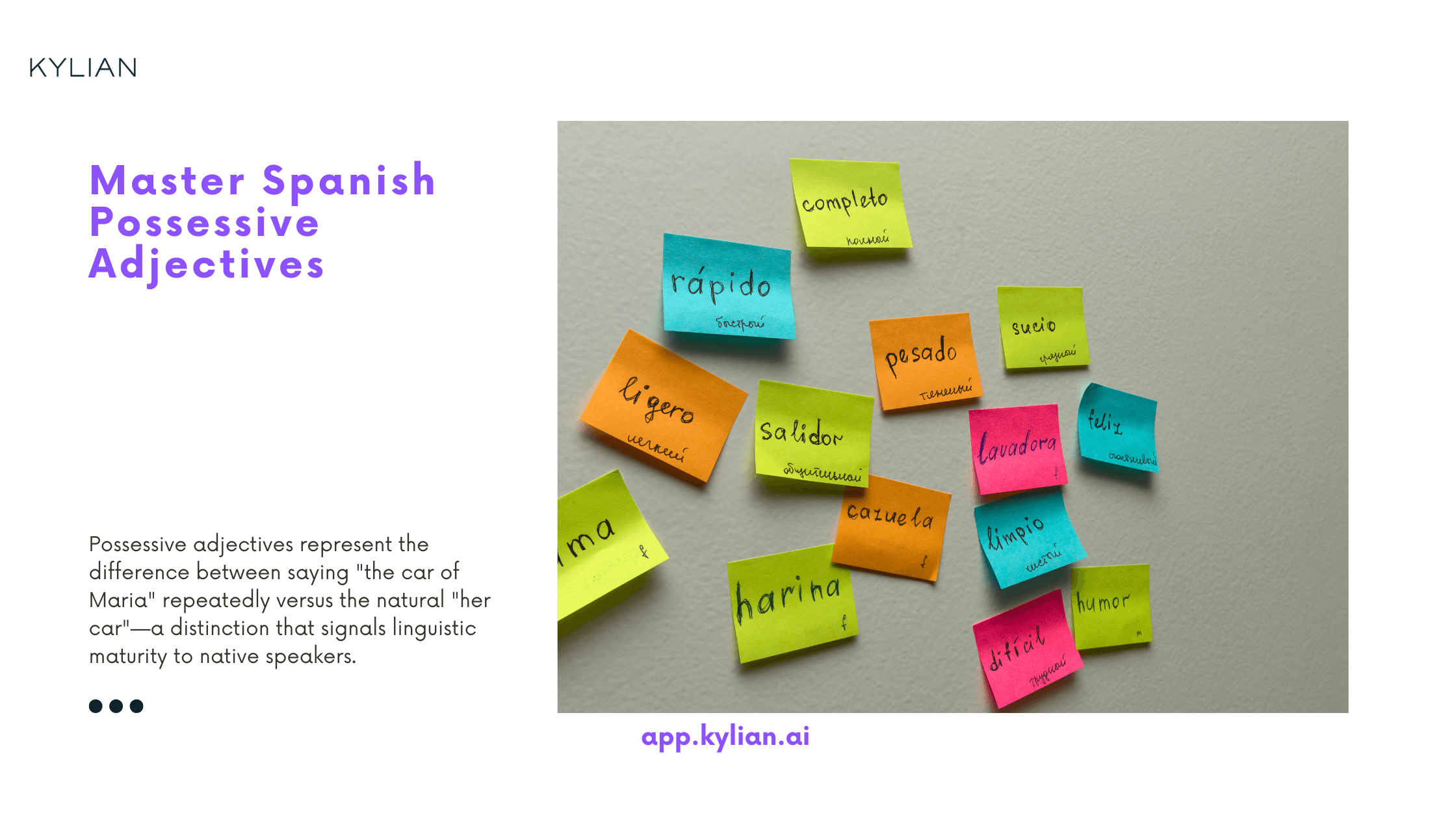Where Most People Come to Learn A Language
Our blog covers language learning tips and hacks we've acquired over the years


‘너 진짜 짜증나’ 영어로 표현하기 – annoying, annoyed 차이
한국어 학습자들이 영어로 감정을 표현할 때 가장 혼란스러워하는 부분 중 하나가 바로 '짜증'이라는 감정을 정확하게 전달하는 것입니다. 특히 "너 진짜 짜증나"라는 표현을 영어로 옮길 때, 많은 사람들이 'annoying'과 'annoyed'를 구분하지 못해 의도와 다른 의미로 전달되는 경우가 빈번합니다.


Cómo usar y conjugar el verbo español 'resbalar'
Resbalar es un verbo en español que significa deslizarse involuntariamente sobre una superficie lisa o mojada. Se utiliza para describir cuando una persona o cosa se desliza y pierde el equilibrio o el control. Algunos sinónimos de resbalar incluyen deslizar, patinar, escurrirse o resbalarse. Este verbo se usa comúnmente en contextos relacionados con accidentes, situaciones de peligro en superficies resbaladizas, o metafóricamente para referirse a errores o descuidos.


Reencauzar - Explicación, oraciones de ejemplo y conjugación
Reencauzar es un verbo en español que significa redirigir, reconducir o volver a poner algo en su cauce original. Se utiliza cuando queremos expresar la acción de devolver algo a su curso o dirección adecuada, después de haberse desviado. Este verbo proviene de la palabra "cauce", que se refiere al lecho de un río o corriente de agua, y el prefijo "re-" que indica repetición o vuelta a un estado anterior. Algunos sinónimos de reencauzar son: reconducir, reorientar, redirigir, encaminar y canalizar. El verbo reencauzar se usa comúnmente en contextos relacionados con proyectos, conversaciones, relaciones, procesos o situaciones que necesitan ser llevados de nuevo a su rumbo correcto.


'in'과 'at + 장소'의 차이점은 뭔가요?
영어에서 'in'은 어떤 공간이나 장소 안에 있다는 의미로 사용되며, 'at'은 특정 지점이나 위치를 가리킬 때 사용됩니다. 두 전치사 모두 장소를 나타내는 데 사용되지만, 그 용법에는 미묘한 차이가 있습니다.


Cómo usar y conjugar 'Won't' en inglés
"Won't" es la forma contracta de "will not" en inglés. Se utiliza principalmente para expresar negación en futuro simple, rechazo o resistencia a hacer algo. Es una contracción muy común en inglés hablado y escrito. Algunos sinónimos o expresiones equivalentes incluyen "will not", "refuse to", o "am/is/are not going to". Se usa en contextos formales e informales, aunque en situaciones muy formales se prefiere usar "will not" sin contraer.


Past Tense of Wear: Complete Guide & Examples
Grammar mistakes in professional communication cost credibility. The irregular verb "wear" trips up even experienced writers because its past tense forms don't follow standard patterns. Whether you're drafting a business email, writing academic papers, or creating content, mastering "wore" versus "worn" prevents embarrassing errors that undermine your expertise. Understanding irregular verbs like "wear" matters because they appear in everyday communication. Unlike regular verbs that simply add "-ed" for past tense, "wear" transforms completely—from "wear" to "wore" to "worn." This complexity explains why grammar checkers often miss these nuances and why manual mastery becomes essential.


Past Tense of Drive: Different Forms & Usage Rules
Mastering irregular verbs separates fluent speakers from those still learning. The verb "drive" exemplifies why understanding past tense forms matters—it's irregular, frequently used, and carries multiple meanings that shift based on context. Whether you're describing yesterday's commute, discussing motivation, or explaining how you operated machinery, knowing when to use "drove," "driven," or "driving" determines whether your communication sounds natural or awkward. The distinction between "I drove to work" and "I have driven to work" isn't just grammatical preference—it fundamentally changes meaning and timing.


American Slang vs British Slang: Terms & Phrases Compared
The linguistic divide between American and British English extends far beyond accent differences. With over 1.5 billion English speakers worldwide and 160 distinct regional variations, the vocabulary gap between these two dominant forms creates genuine communication barriers that affect everything from business negotiations to casual conversations. Understanding these differences isn't merely academic curiosity—it's practical necessity. Whether you're navigating a London pub conversation or decoding American workplace banter, these linguistic variations carry cultural weight that can make or break social interactions.


Right Off the Bat: Master This English Idiom Like a Native
You've likely encountered native English speakers using "right off the bat" in conversations, emails, or presentations, yet its meaning might remain unclear. This baseball-derived idiom carries nuanced implications that extend far beyond its literal sports origin. "Right off the bat" means immediately, without delay, or from the very beginning of something. Understanding this phrase isn't merely about vocabulary expansion—it's about grasping the urgency and immediacy that Americans communicate in both professional and casual contexts. The idiom reflects cultural values around efficiency and directness that permeate English-speaking business environments and social interactions.


How to Abbreviate Coordinator: Know It All
Business communication demands precision, especially when space constraints force us to condense lengthy job titles and organizational roles. The position of coordinator appears across virtually every industry, from project management to human resources, yet professionals consistently struggle with its abbreviation. The challenge isn't simply shortening a word—it's maintaining clarity while adhering to industry standards that vary significantly across sectors. Whether you're drafting organizational charts, creating business cards, or updating LinkedIn profiles, understanding proper coordinator abbreviations prevents miscommunication and maintains professional credibility. In this article, we'll examine the most effective methods to abbreviate coordinator across different contexts, from formal business documents to digital communications, ensuring your abbreviated titles remain both recognizable and professional.


What Does "wrt" Mean? Complete Guide to Usage
You encounter "wrt" in emails, text messages, and online discussions, but its meaning remains unclear? This abbreviation carries significant weight in professional and academic communication, yet many English speakers struggle with its proper application. "Wrt" stands for "with respect to" or "with regard to," serving as a concise way to introduce topics, reference points, or establish context in written communication. Understanding "wrt" matters because miscommunication costs businesses an average of $62.4 million annually according to recent productivity studies. When abbreviations like "wrt" create confusion, they contribute to this communication breakdown. More critically, mastering this abbreviation enhances your ability to communicate precisely in environments where brevity and clarity determine professional success.


Lightbulb vs Light Bulb: When English Spelling Matters
The distinction between "lightbulb" and "light bulb" represents more than orthographic preference—it reflects evolving linguistic conventions that impact professional communication, technical documentation, and formal writing standards. While both terms reference the same illumination device, their usage patterns reveal underlying principles about compound word formation, industry standards, and contextual appropriateness that warrant systematic examination. In English, "lightbulb" functions as a single compound noun, typically employed in informal contexts and contemporary usage. Conversely, "light bulb" operates as a two-word noun phrase, predominantly found in technical specifications, formal documentation, and traditional publishing. Understanding when each form serves optimal communicative function requires analyzing their grammatical behavior, semantic implications, and contextual constraints.


What does going loca mean?
You've encountered Spanish speakers using "loca" in conversations, songs, or social media, but the meaning remains elusive? The confusion is understandable. "Loca" represents one of Spanish's most contextually fluid expressions, carrying meanings that shift dramatically based on tone, relationship dynamics, and cultural setting. Understanding "loca" requires grasping not just its literal translation—"crazy woman"—but its intricate social applications that span affection, criticism, empowerment, and everything between.


Master Spanish Possessive Adjectives
Mastering Spanish possessive adjectives represents a critical juncture in your language journey—one that separates basic communication from sophisticated expression. These grammatical tools don't merely indicate ownership; they establish relationships, clarify meaning, and prevent the repetitive naming that marks beginner Spanish speakers. The significance extends beyond grammar textbooks. Research from the Cervantes Institute demonstrates that learners who master possessive structures achieve 40% better comprehension scores in conversational Spanish. This correlation exists because possessive adjectives force you to understand gender agreement, number concordance, and contextual relationships simultaneously—three foundational pillars of Spanish fluency. Why does this matter now? Spanish continues its trajectory as the world's second most spoken language by native speakers, with over 500 million speakers globally. Professional opportunities increasingly demand nuanced Spanish communication, not survival-level phrases. Possessive adjectives represent the difference between saying "the car of Maria" repeatedly versus the natural "her car"—a distinction that signals linguistic maturity to native speakers.


Is It Cuter or More Cute? English Grammar Explained
The English language presents a fascinating puzzle when it comes to comparative adjectives, particularly with words that seem to straddle the line between simple and complex forms. "Cute" represents one of these linguistic challenges that native speakers navigate intuitively but can perplex language learners. In English, "cute" transforms into "cuter" when making comparisons, while "more cute" exists in a grammatical gray area that reflects the evolution of modern usage patterns. This distinction matters because it reveals fundamental principles about how English handles comparison, rhythm, and emphasis. Understanding when to use "cuter" versus "more cute" isn't merely about following rules—it's about grasping the underlying logic that governs how English speakers naturally express degrees of comparison.


Tumour vs Tumor: Master English Medical Spelling
Medical terminology demands precision, yet one of the most frequently confused word pairs in healthcare writing continues to trip up professionals and students alike. In English, 'tumour' represents the British spelling convention while 'tumor' follows American English standards. Both terms describe the same medical phenomenon—an abnormal growth of tissue—but their usage carries implications that extend far beyond simple spelling preferences. The distinction matters because medical documentation, research publications, and patient communications require consistency that reflects your intended audience and professional context. Healthcare professionals operating in international environments must navigate these variations daily, making this knowledge essential rather than academic.
![Solve vs Resolve: Key Differences [English]](/_next/image?url=https%3A%2F%2Fcdn.sanity.io%2Fimages%2F147z5m2d%2Fproduction%2F5ae51ea8c0c6f48da8fd1b92156d26661665eae8-2240x1260.png&w=3840&q=75)

Solve vs Resolve: Key Differences [English]
The English language presents learners with countless word pairs that appear interchangeable but carry distinct meanings that can fundamentally alter communication effectiveness. Among these challenging pairs, "solve" and "resolve" stand out as particularly problematic for both native speakers and English learners. While "solve" means to find a definitive answer or solution to a specific problem through logical analysis or methodology, "resolve" encompasses a broader spectrum of meaning—from making firm decisions to settling disputes or determining outcomes through various means, not necessarily requiring a single correct answer. This distinction matters more than academic precision suggests. In professional environments, using "solve" when you mean "resolve" can create unrealistic expectations about deliverables and timelines. When a manager asks a team to "solve" a client retention issue, they're implying there's a specific, discoverable solution. If they ask to "resolve" the same issue, they're acknowledging that multiple approaches might work, and the focus shifts to achieving a satisfactory outcome rather than finding the perfect answer.


Best Regards vs Warm Regards: When Tone Defines Impact
Professional communication hinges on precision, and nowhere is this more evident than in email closings. In English, "best regards" serves as a formal, neutral sign-off that maintains professional distance, while "warm regards" introduces an element of personal connection and approachability. The distinction between these two phrases extends far beyond mere word choice—it reflects your understanding of professional relationships, cultural context, and strategic communication.


What Does 'Godspeed' Mean? Complete English Guide
You hear English speakers say 'godspeed' in movies, literature, and formal speeches, but the meaning remains elusive? This archaic yet powerful word carries centuries of tradition and continues appearing in contemporary English across multiple contexts. Understanding 'godspeed' reveals not just its literal meaning but its profound cultural significance in English-speaking societies. 'Godspeed' functions as both a blessing and farewell, literally meaning "may God prosper your journey" or "may God grant you success." This compound word combines "God" with "speed," where "speed" derives from the Old English "spēd" meaning prosperity, success, or good fortune—not velocity as modern usage suggests.


What Does 'Cheeky' Mean? Master This English Word
So you encounter native English speakers using "cheeky" but find yourself puzzled by its meaning? This confusion is understandable. "Cheeky" represents one of English's most culturally nuanced words, carrying implications that extend far beyond its dictionary definition. In English, "cheeky" describes behavior that is playfully disrespectful, boldly impudent, or endearingly presumptuous—but the cultural weight behind this word makes it impossible to master without understanding its contextual applications. The significance of mastering "cheeky" extends beyond vocabulary expansion. This word encapsulates a distinctly British approach to social interaction, where directness meets humor, and boldness pairs with charm. When you understand "cheeky," you unlock a deeper appreciation for English-speaking cultures' tolerance for playful boundary-pushing.


Communication Acronyms You Need to Know
Communication has evolved dramatically with technology, creating a lexicon of abbreviations that shape how we interact professionally and personally. These acronyms aren't just shortcuts—they're efficiency tools that, when used correctly, can enhance clarity and speed in our exchanges. Mastering communication acronyms matters because miscommunication costs organizations an average of $37 billion annually according to the Society for Human Resource Management. Understanding these abbreviations eliminates confusion, accelerates decision-making, and demonstrates professional competency in modern workplace environments.


Grand Niece vs Great Niece: Which Is Correct in English?
Family terminology creates more confusion than most people realize. In English, "grand niece" and "great niece" both refer to the daughter of your nephew or niece, yet only one represents standard usage. "Great niece" stands as the universally accepted term in formal English, while "grand niece" appears in colloquial speech but lacks grammatical precision. This distinction matters because family relationships form the foundation of legal documents, genealogical records, and professional communications where accuracy cannot be compromised.


Plural of Curriculum: Your Complete Grammar Guide
Academic writing demands precision, and few words cause more confusion than "curriculum" when pluralization enters the equation. Whether you're drafting a research proposal, writing educational policy documents, or simply describing multiple academic programs, understanding the correct plural forms separates professional communicators from those who inadvertently undermine their credibility. The confusion stems from curriculum's Latin origins, where traditional grammar rules collide with modern usage patterns. Educational professionals, administrators, and writers frequently stumble over whether to use "curricula," "curriculums," or navigate contextual variations that dictate proper form. This guide examines both plural forms—their grammatical foundations, appropriate contexts, and practical applications across academic, professional, and casual communication settings.


Madame Abbreviations: Ways to Address Women
Professional correspondence demands precision. When addressing women in formal contexts, the difference between "Mrs." and "Ms." can make or break first impressions. Yet most professionals struggle with the nuanced applications of madame abbreviations across different cultural and professional settings. The stakes are higher than many realize. A 2023 workplace communication study revealed that 67% of women notice incorrect title usage in professional emails, with 34% viewing it as a competency indicator. Understanding madame abbreviations isn't just about etiquette—it's about demonstrating cultural intelligence and professional acumen. Whether you're drafting international business correspondence, academic communications, or formal invitations, mastering these abbreviations will elevate your professional presence. This guide examines every major madame abbreviation, their proper contexts, and the cultural nuances that determine appropriate usage.